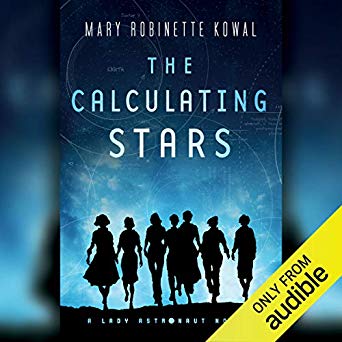 The Calculating Stars (Lady Astronaut, #1) by Mary Robinette Kowal
The Calculating Stars (Lady Astronaut, #1) by Mary Robinette Kowal Format: audiobook, eARC
Source: purchased from Audible, supplied by publisher via Edelweiss
Formats available: paperback, ebook, audiobook
Genres: alternate history, science fiction
Series: Lady Astronaut #1
Pages: 431
Published by Tor Books on July 3, 2018
Purchasing Info: Author's Website, Publisher's Website, Amazon, Barnes & Noble, Kobo, Bookshop.org
Goodreads
On a cold spring night in 1952, a huge meteorite fell to earth and obliterated much of the east coast of the United States, including Washington D.C. The ensuing climate cataclysm will soon render the earth inhospitable for humanity, as the last such meteorite did for the dinosaurs. This looming threat calls for a radically accelerated effort to colonize space, and requires a much larger share of humanity to take part in the process.
Elma York’s experience as a WASP pilot and mathematician earns her a place in the International Aerospace Coalition’s attempts to put man on the moon, as a calculator. But with so many skilled and experienced women pilots and scientists involved with the program, it doesn’t take long before Elma begins to wonder why they can’t go into space, too.
Elma’s drive to become the first Lady Astronaut is so strong that even the most dearly held conventions of society may not stand a chance against her.
My Review:
This was one of those times when I had to put off writing my review for a few days after finishing the book so that I could tone down the squeeing and be halfway coherent. And I’m still not sure I’m going to manage it.
The Calculating Stars is enthralling, exhilarating and infuriating, sometimes in equal measure. And those are three things that are just not meant to go together. But this time they absolutely do.
There are three, let’s call them prongs, to this story. Or themes. Or threads. They happen simultaneously and are completely interwoven, but there are three of them just the same.
The first is the very big bang that sets off the entire story. It’s 1952 and Drs. Nathaniel and Elma York are vacationing in the Poconos when they witness, from a barely safe enough distance, a meteor crashing into the Eastern Seaboard of the U.S. Somewhere near DC.
It turns out to be the Chesapeake Bay, or thereabouts. And thereby lies the crux of the matter. Because the meteor strikes water and not land. Which initially is thought to be better – for extremely select definitions of better – but is actually much, much worse than a land strike.
As Elma York flies herself and her husband inland to someplace where there might still be “civilization” or at least safety, she begins the calculations. That’s what she does, she’s a mathematics genius who can do most of the work in her head.
And the results, eventually confirmed by climatologists and meteorologists around the world, is chilling in its results. That water strike was an extinction-level event. Like the one that wiped out the dinosaurs.
Except that human beings are capable of figuring out what is coming. The question, throughout the book, is whether they are capable of mustering the political will to do something about it, before it is too late.
And that is the heart of this marvelous book – and where human beings show both the best and worst sides of themselves – often at the same time.
Nathaniel York is an engineer. He and Elma were both employed by the National Advisory Committee for Aeronautics, or NACA. Nathaniel is the leading survivor of NACA’s engineering team, and finds himself the lead engineer for everything that comes next.
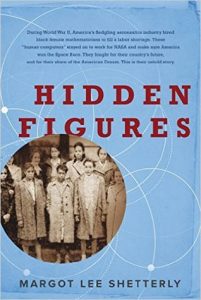 Elma is a computer. In the 1950s, computers were women and not machines, as has been detailed in several recent nonfiction books about the period, notably Hidden Figures and The Rise of the Rocket Girls.
Elma is a computer. In the 1950s, computers were women and not machines, as has been detailed in several recent nonfiction books about the period, notably Hidden Figures and The Rise of the Rocket Girls.
But it’s the 1950s, and Elma’s mathematical genius, wartime pilot experience as a WASP (Women Airforce Service Pilot) and not just one but two Ph.Ds, is initially completely ignored by the men running the show. Even though it was her calculations that determined the scope of the disaster.
The response to the disaster is the second prong of this story. Earth is going to go through a brief but survivable mini-ice age and then the temperatures are going to start rising. The water thrown up by the meteor strike is going to kick off a runaway greenhouse effect. In a century or so, the seas are going to boil away.
The only way out is off. Human beings need to find another basket in which to put our eggs. We have to get off this rock before it’s too late. The second prong of the story is the development of the space program a decade before it happened in our history, and under much more desperate conditions.
The third prong of the story relates to the way that Elma’s contributions are ignored, because it comes back to the fact that the general population in the 1950s had terribly misogynistic views about women, and terribly racist views about anyone who wasn’t white. And that’s combined with the usual human problems of not being willing to think in the long term when current conditions seem pretty good for their individual perspective – think of current reactions to climate change to see how that part works.
The story is told from Elma’s educated, intelligent, informed perspective as she is forced to deal with a whole bunch of men who either hate her for her achievements, disbelieve her because she is female, or both, and will do anything to keep her down and out because her existence and perseverance upsets their worldview.
We are with her every step of the way as she is forced to cajole, accommodate, hope, fear, pray and scream as she pushes or sidles her way into the halls of power – and into the stars.
Escape Rating A+: In my head, I’ve labeled those three plot threads as “the Good, the Bad, and the Ugly” – complete with theme music. Do not mistake me, that rating is for real, this book is utterly awesome from beginning to end. And the audio is fantastic and amazing and read by the author. Which is even more amazing. The only author I’ve ever listened to who is half this good as a narrator is Neil Gaiman.
But those prongs of the story, they definitely fit the theme. The initial meteor strike is the Bad. Very, very bad. There really isn’t a way to think of an extinction-level event as good, after all. The sheer number of people who are wiped out in that instant should defy imagination – and it does. At the same time, the author does a fantastic job of personalizing all of the attendant grief through Elma’s reactions. Her family, her parents and grandparents, and pretty much everyone she knew or worked with, is gone in an instant. Her grief is heart-felt and utterly heartbreaking.
The space program is the Good part of the equation. Not that some of the details of how that sausage gets made don’t dive into the Ugly, but the concept and overall progression of the space program were very good. So good that it made me cry when we see all the emotions in Elma’s head and heart when she attends a launch with her great-aunt. (In the end Elma does discover that she has two surviving family members besides her husband. And her commingled joy and grief at those discoveries is beautiful.)
But there’s plenty of ugliness in this story, and it’s that ugliness that makes the reader want to scream. Or at least this reader.
This story takes place in an alternate 1950s. Sexism and racism were at a high-water mark during that decade, which resulted in the cultural upheavals of the 1960s in real history. In this story, it’s all on display, and it’s ugly right down to the bone. Not just in the way that Blacks are treated when they are present in the narrative – and they definitely are – but also the way that political forces try to use the terrible circumstances to literally remove them from that narrative. And the ways that they fight back. That part of the story sent chills up my spine both in its verisimilitude and its portrayal of an entire society’s callous disregard for millions of people due to the color of their skin.
And, because the story is told through Elma’s perspective, we feel every time she is ignored or set aside or deliberately blocked from achieving her dreams as a body blow. I wanted to reach through the book and knock some sense into many, many of the male characters. Most of them deserve a good swift kick where it would hurt the most.
Elma’s husband Nathaniel, however, is a complete mensch. Mensch is a Yiddish term of high compliment, implying just how truly good that person is.
It also signifies something that is a kind of underlying thread through this entire story. Elma and Nathaniel are Jewish. And it matters. To others it may not be that big of a deal, but for me it mattered so much. In Elma’s use of occasional Yiddish, the way that she sat Shiva and mourned for all of the family that she had lost, her desire to be a bit more observant in the wake of both the Holocaust and the ongoing tragedy, I more than felt for her. I felt part of her. I felt heard and represented at a very deep level.
 The way that I was drawn into her story because she represented me in a way that most characters do not gave me a new appreciation for the power of representation in literature and the arts. It made me appreciate the Cuban heritage of Eva Innocente in Chilling Effect because I knew that if Elma made me feel represented in The Calculating Stars, then Eva gave those exact same feels to the LatinX women that she represents while telling her own marvelous story.
The way that I was drawn into her story because she represented me in a way that most characters do not gave me a new appreciation for the power of representation in literature and the arts. It made me appreciate the Cuban heritage of Eva Innocente in Chilling Effect because I knew that if Elma made me feel represented in The Calculating Stars, then Eva gave those exact same feels to the LatinX women that she represents while telling her own marvelous story.
But the story of the Lady Astronaut has barely begun when The Calculating Stars ends. The Fated Sky continues Elma’s journey and is already out. A parallel story, The Relentless Moon, will be released next summer. I can’t wait to see just how far Elma goes, and how she manages to get there.
There’s a reason that The Calculating Stars won the Hugo Award for Best Novel this year. Take flight with the Lady Astronaut and see for yourself.

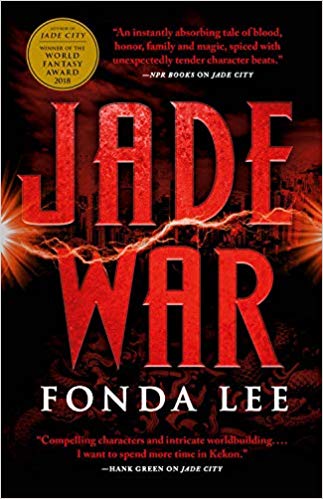 Jade War (The Green Bone Saga, #2) by
Jade War (The Green Bone Saga, #2) by 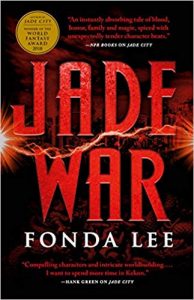 I picked up Jade War just about the minute I finished the absolutely awesome
I picked up Jade War just about the minute I finished the absolutely awesome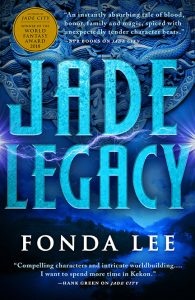 Jade War also takes this story of gangland warfare to a wider stage while telling a tale that provides standout roles for the women as well as the men of the clan AND adds a fascinating dose of world-wide political skulduggery to what was initially an urban fantasy about warring criminal organizations. The Green Bone Saga was a terrific story when it was confined to two families and one city. Now that it has gone world-wide, it is epic in every sense of the word. This is one of those books that just needs a higher grade than A+. Seriously, all the stars for this one.
Jade War also takes this story of gangland warfare to a wider stage while telling a tale that provides standout roles for the women as well as the men of the clan AND adds a fascinating dose of world-wide political skulduggery to what was initially an urban fantasy about warring criminal organizations. The Green Bone Saga was a terrific story when it was confined to two families and one city. Now that it has gone world-wide, it is epic in every sense of the word. This is one of those books that just needs a higher grade than A+. Seriously, all the stars for this one.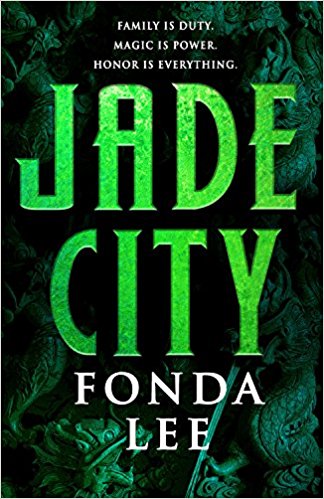 Jade City (The Green Bone Saga, #1) by
Jade City (The Green Bone Saga, #1) by 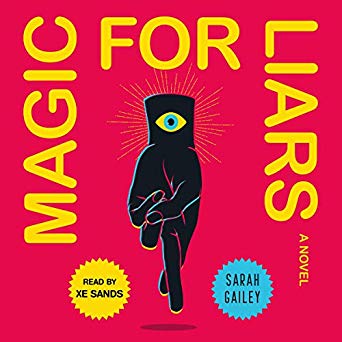 Magic for Liars by
Magic for Liars by 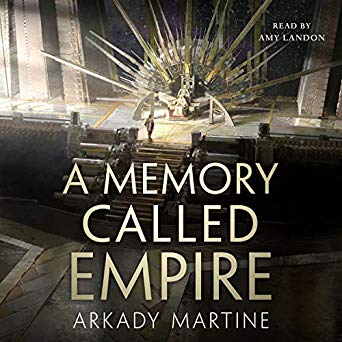 A Memory Called Empire (Teixcalaan, #1) by
A Memory Called Empire (Teixcalaan, #1) by 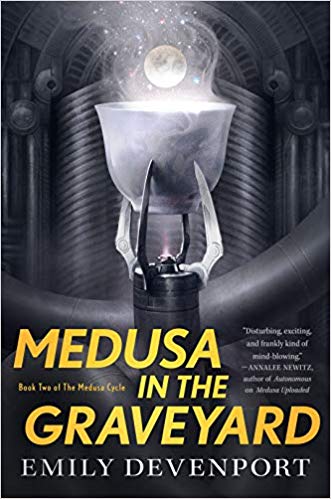 Medusa in the Graveyard (The Medusa Cycle, #2) by
Medusa in the Graveyard (The Medusa Cycle, #2) by 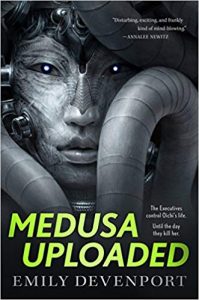 I picked up Medusa in the Graveyard because I absolutely adored the first book in the
I picked up Medusa in the Graveyard because I absolutely adored the first book in the 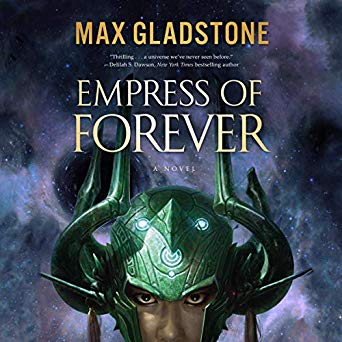 Empress of Forever by
Empress of Forever by 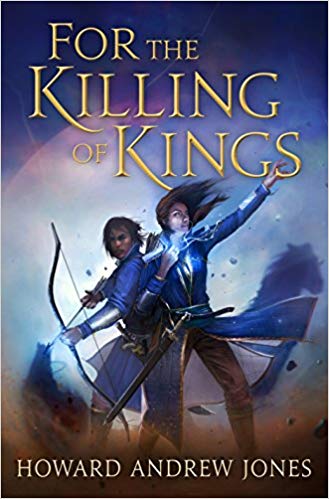 For the Killing of Kings (The Ring-Sworn Trilogy, #1) by
For the Killing of Kings (The Ring-Sworn Trilogy, #1) by 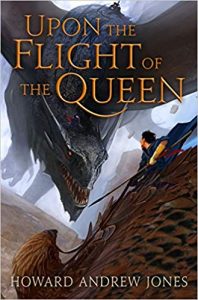 In the end, I enjoyed the story, but was left with the strong impression that it was a lesser version of the marvelous
In the end, I enjoyed the story, but was left with the strong impression that it was a lesser version of the marvelous 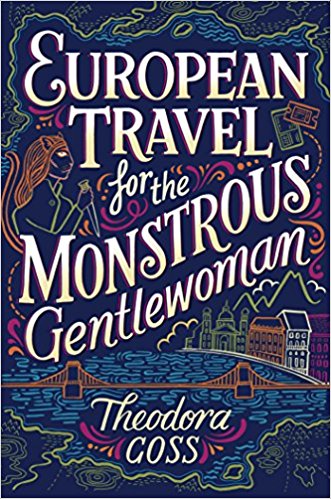 European Travel for the Monstrous Gentlewoman by
European Travel for the Monstrous Gentlewoman by 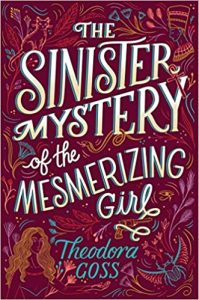 About Irene, she’s the perfect “mentor” figure for this series. If her name sounded familiar, it should. Irene Norton, nee Irene Adler, was THE woman in the Sherlock Holmes stories, the only woman ever to get the better of him. Holmes is out of the action in this one – appropriately so – and it is time for a woman to take up the reins. Irene is perfect for this role because unlike Holmes, Irene is used to working from the shadows. The members of the Athena Club do not need someone to protect them, a role that Holmes and Watson constantly try to assume. Irene enables them and lets them do their work.
About Irene, she’s the perfect “mentor” figure for this series. If her name sounded familiar, it should. Irene Norton, nee Irene Adler, was THE woman in the Sherlock Holmes stories, the only woman ever to get the better of him. Holmes is out of the action in this one – appropriately so – and it is time for a woman to take up the reins. Irene is perfect for this role because unlike Holmes, Irene is used to working from the shadows. The members of the Athena Club do not need someone to protect them, a role that Holmes and Watson constantly try to assume. Irene enables them and lets them do their work.
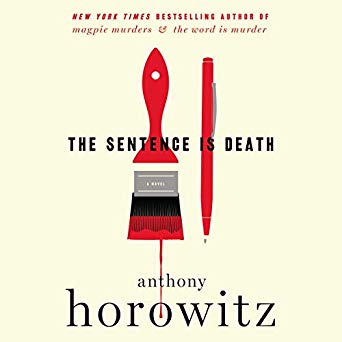 The Sentence is Death (Hawthorne, #2) by
The Sentence is Death (Hawthorne, #2) by 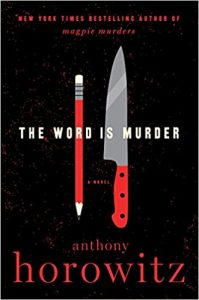 The Sentence is Death begins much the same way that
The Sentence is Death begins much the same way that